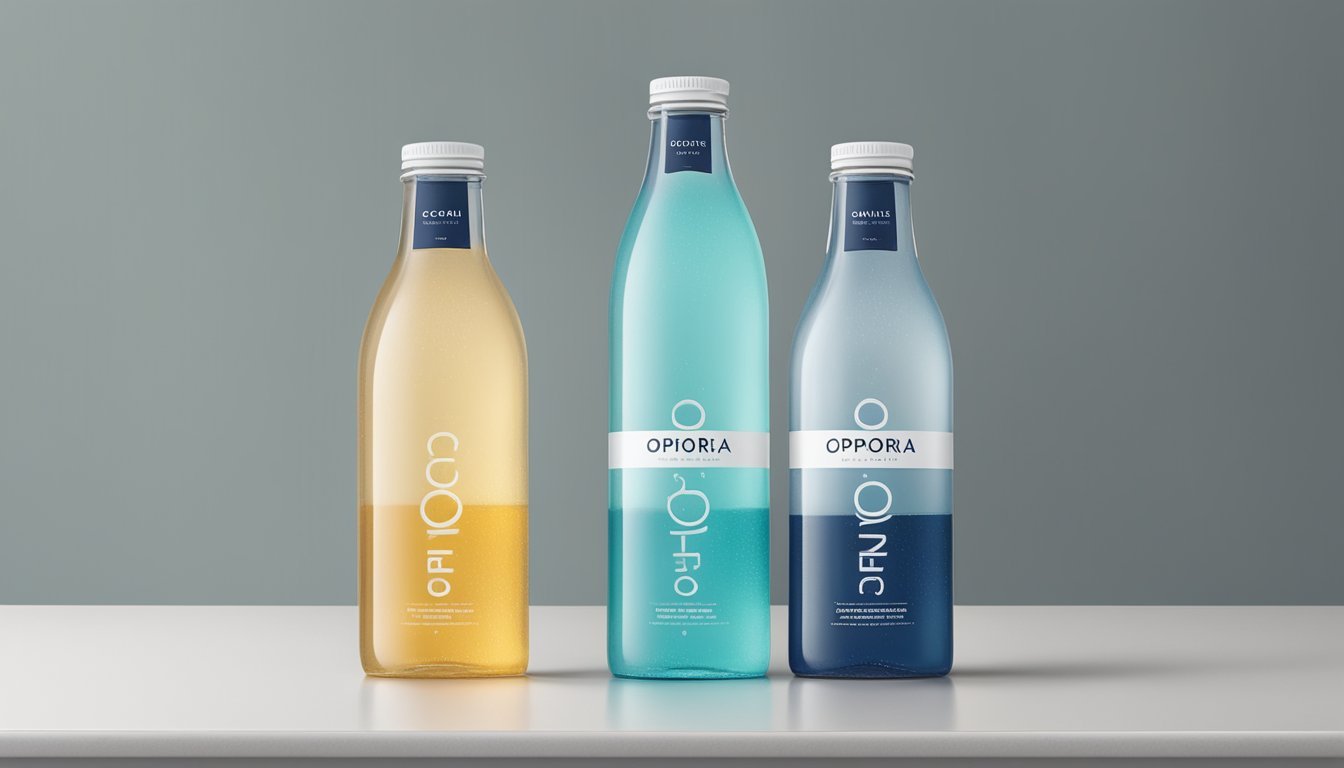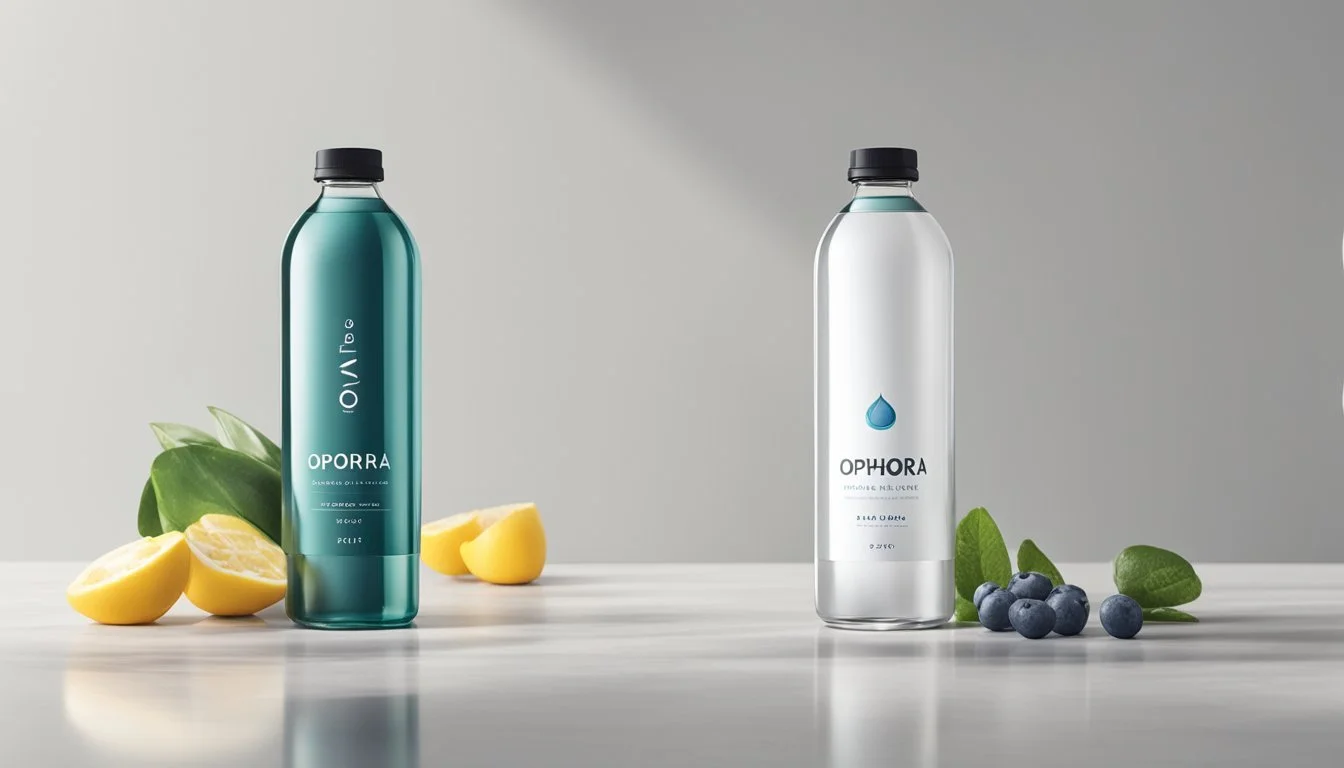Essentia vs. Ophora
Evaluating the Best Bottled Water Choice
Choosing the right bottled water can be a daunting task with so many options available. Essentia and Ophora are two leading brands known for their commitment to purity and health benefits. Both offer distinct features and benefits, making it essential to understand what sets them apart.
Essentia water is renowned for its high pH level and ultra-purification process. Infused with electrolytes and ionized to a pH of 9.5 or higher, it claims to provide superior hydration. For those who prioritize consistent purity and enhanced hydration, Essentia stands out as a top choice.
On the other hand, Ophora focuses on providing oxygen-rich water, claiming benefits for athletic performance and recovery. It is also praised for its sustainable practices and minimal environmental impact. Comparing these two brands involves considering health benefits, taste, and environmental responsibility, allowing the reader to make an informed decision based on their personal preferences and needs.
Understanding Bottled Water
Bottled water comes in various types, each with specific characteristics and regulations. The production and consumption of bottled water have implications for health and the environment.
Types of Bottled Water
Bottled water can be categorized into several types: spring water, mineral water, purified water, and sparkling water.
Spring water is collected from natural springs and contains minerals that are beneficial to health.
Mineral water is sourced from mineral springs and must contain at least 250 parts per million total dissolved solids.
Purified water is typically treated through processes like reverse osmosis to remove impurities, making it extremely clean.
Sparkling water contains carbon dioxide, giving it a fizzy texture that's often preferred by consumers.
Bottled Water Regulations
Bottled water is regulated to ensure safety and quality. In many countries, including the United States, the Food and Drug Administration (FDA) oversees these regulations.
Manufacturers must meet stringent standards for contaminant levels, labeling, and bottling practices.
Water quality is regularly tested for microorganisms and harmful chemicals. Labels must clearly indicate the water source and any added substances.
Environmental Impact of Bottled Water
The production and disposal of plastic bottles significantly impact the environment.
The manufacturing process uses large amounts of energy and water. Additionally, millions of plastic bottles end up in landfills and oceans, contributing to pollution and harming marine life.
Efforts to mitigate this impact include recycling programs and innovations in biodegradable packaging. Some companies are also exploring the use of reusable bottles and alternative materials to reduce their carbon footprint.
The Science Behind the Water
Understanding the composition and treatment of bottled water can help consumers make informed choices. This section covers the critical aspects of pH levels, electrolytes, and purification processes.
pH Levels and Alkalinity
Essentia and Ophora both highlight the pH levels of their water. Essentia water is ionized and boasts a pH of 9.5, making it significantly alkaline. Higher pH levels are suggested to neutralize acid in the body, promoting better hydration and overall wellness.
Ophora, known for its high alkalinity, also ensures a pH level above 9.0. Alkaline water is believed to help balance pH levels in the body, potentially improving energy and focus. Consumers seeking alkaline water will find both brands appealing.
Electrolytes and Hydration
Electrolytes play a vital role in hydration, and both brands incorporate this feature into their bottled water. Essentia infuses their water with electrolytes after purification, ensuring consistency and quality. This helps in maintaining fluid balance, muscle function, and nerve signaling.
Ophora also contains a blend of minerals and electrolytes, aimed at optimizing hydration. Regular consumption of electrolyte-enhanced water can aid in post-exercise recovery. These additions make both brands suitable for those with an active lifestyle.
Purification and Filtration Processes
Both Essentia and Ophora undergo rigorous purification processes. Essentia uses micro-filters, reverse osmosis, and ultraviolet exposure to achieve 99.9% purity. The water is then ionized to create the desired alkalinity.
Ophora incorporates a multi-step filtration process, including microfiltration and distillation, to ensure purity. The water is treated to remove impurities and pathogens, resulting in highly purified water. Advanced purification processes make these brands stand out in quality and safety.
Health Benefits of Hydration
Proper hydration plays a significant role in maintaining cognitive function and ensuring the overall quality of one’s health. Both Essentia and Ophora waters aim to provide quality hydration that supports these benefits.
Hydration and Cognitive Function
Adequate hydration is crucial for maintaining cognitive function. Mild dehydration can impair attention, memory, and mood. Studies show that even a 1-2% loss in body water can lead to cognitive deficits, affecting performance and concentration.
Water helps maintain the brain's temperature and remove toxins, improving synaptic plasticity. Drinking water regularly supports mental clarity, alertness, and a sense of well-being. This is especially important for individuals engaging in mentally demanding tasks or those exposed to high temperatures or physical exertion.
Water Quality and Health
Water quality affects overall health by providing essential minerals and maintaining body fluid balance. Essentia Water has a high pH of 9.5, touting alkaline properties that may help neutralize acid in the bloodstream. On the other hand, Ophora claims to offer ultra-pure, oxygenated water.
Both brands emphasize hydration, but the distinction lies in their unique water enhancements. Essentia’s ionized water aims at optimal hydration, while Ophora focuses on purity and oxygen content. High-quality water supports cellular functions, metabolic processes, and can potentially assist in weight management efforts. Additionally, quality bottled water offers a safer alternative to tap water in some areas where contamination is a concern.
Comparative Analysis of Essentia and Ophora
Essentia and Ophora offer unique benefits regarding source quality, taste, and accessibility. Each brand has distinct characteristics that cater to different consumer preferences.
Source and Quality Comparison
Essentia sources its water from various locations. The process includes micro-filtration, reverse osmosis, and ultraviolet exposure to achieve 99.9% purity. The water is then ionized to create an alkaline water with a high pH of 9.5 or above and infused with electrolytes.
Ophora obtains its water from pristine natural springs and aquifers. The brand emphasizes oxygen-rich water with extensive purification, including UV filtration and ozonation. Ophora's pH ranges from 7.5 to 8.5, slightly lower than Essentia, but still within the alkaline range.
Aspect Essentia Ophora Source Various locations Natural springs and aquifers Purification Micro-filtration, reverse osmosis UV filtration, ozonation Alkalinity (pH) 9.5+ 7.5-8.5
Taste Profile and Consumer Preference
Essentia has a clean, crisp taste, partly due to its high purification and added electrolytes for taste enhancement. It is popular among those who prefer water with a higher alkaline content.
Ophora is also recognized for its fresh and pure taste, attributed to its natural sourcing and oxygenation process. The slight difference in pH gives it a softer taste compared to Essentia. Both brands have a loyal consumer base.
Consumer Preferences:
Essentia: Preferred for consistency in taste and high pH.
Ophora: Favored for its natural source and purity.
Price and Accessibility
Essentia is widely available in various retail locations and online platforms. Its price point is moderate, making it accessible to a broad audience. A typical 1-liter bottle ranges around $2.
Ophora is less widely available but can be found in specialty stores and online. It is priced higher due to its premium sourcing and extensive purification. A 1-liter bottle can cost between $3-$4.
Aspect Essentia Ophora Availability Widespread Limited, specialty stores Price ~$2 per 1-liter ~$3-$4 per 1-liter
Essentia and Ophora cater to different consumer segments based on price, availability, and preference for water quality and taste.
Product Offerings and Brand Philosophies
Essentia and Ophora offer distinct bottled water products, each backed by unique brand philosophies. Essentia emphasizes optimal hydration through ionized, alkaline water, while Ophora focuses on purity and environmental consciousness.
Essentia's Brand Ethos
Essentia Water targets health-conscious individuals by delivering ionized alkaline water. With a pH of 9.5 or higher, it promotes better hydration and balances body acidity. The brand highlights added electrolytes for taste, claims improved hydration, and mentions potential health benefits.
Essentia positions itself as a premium water brand, emphasizing advanced filtration processes that remove contaminants. This aligns with a market trend where consumers seek products allegedly supporting health and wellness goals.
Ophora's Environmental and Health Consciousness
Ophora underscores its commitment to environmental sustainability and health. The brand promises ultra-pure water, free from contaminants, following strict Environmental Protection Agency guidelines. The extensive filtration and oxygenation processes ensure quality and purity.
Ophora contributes significantly to environmental protection efforts by using eco-friendly packaging and sustainable practices. It appeals to environmentally conscious consumers who prioritize both personal health and eco-responsibility. Their alternatives to traditional bottled waters reinforce their dedication to a green planet and pure hydration.
Consumer Reviews and Market Trust
Essentia and Ophora both have distinct consumer bases that speak highly of their respective products. Examining customer reviews alongside expert endorsements reveals how these brands establish market trust.
Analysis of Customer Reviews
Customer reviews for Essentia water are generally positive, with many praising its high pH level and consistent taste. On Amazon, Essentia often garners high ratings, with users highlighting its refreshing quality and perceived health benefits.
Ophora, meanwhile, receives accolades for its purity and innovative oxygenation process. Customers often comment on the brand's commitment to sustainability and unique features not commonly found in other bottled waters.
Both brands have their share of criticism, usually centered around price points and availability. Essentia's price is commonly seen as a barrier, whereas Ophora’s niche appeal sometimes limits its market penetration.
Expert Opinions and Endorsements
Essentia has earned endorsements from athletes and wellness experts, who frequently mention its ionized hydration and pH balance. This support aids in bolstering its credibility and market trust. Reports from various industry journals emphasize Essentia’s rigorous purification process, reinforcing its reputation.
Ophora’s expertise is backed by environmental journalists who focus on its sustainable practices. Endorsements come from a range of health advocates, attracted by the brand’s commitment to delivering oxygen-rich water.
The brand’s specialized nature often appeals to niche markets more focused on wellness innovations. Both brands have managed to secure their positions through strategic endorsements and positive expert reviews, thus earning a considerable amount of market trust.
Exploring Alternatives to Essentia and Ophora
Many bottled water brands offer unique benefits, from high pH levels to eco-friendly packaging. Each brand has distinct attributes, aiming to provide better hydration and appealing flavors.
The Landscape of Bottled Water Brands
Smartwater, known for its crisp flavor and vapor-distilled purity, is an option for those seeking clean drinking water. Evian and Fiji Water both source from natural springs, offering mineral-rich profiles that some consumers prefer. Dasani and Aquafina, owned by Coca-Cola and PepsiCo respectively, often incorporate minerals like calcium chloride and sodium bicarbonate to enhance taste.
More premium brands such as San Pellegrino and Acqua Panna offer distinct mineral compositions, contributing to their unique flavors. In comparison, LIFEWTR focuses on pH balance and essential nutrients, offering an ionized alkaline water option without added contaminants.
Rise of Eco-Friendly Water Packaging
Eco-friendly packaging is increasingly significant in the bottled water market. Boxed Water is one of the pioneers, using recyclable paper cartons to reduce plastic waste. Flow Water is another brand investing in sustainable packaging, using renewable plant-based materials.
Nestlé Pure Life has ventured into eco-friendly spheres too, incorporating recycled PET in their bottles. Ethos Water and Path also emphasize sustainability, offering refillable aluminum bottles.
Innovative packaging solutions, such as Icelandic Glacial’s use of BPA-free materials, demonstrate the industry's commitment to reducing its environmental footprint while providing quality hydration options.
More About Essentia
Essentia vs Cascade Mountain: Which Bottled Water is Better?
Essentia vs Hawaiian Springs: Which Bottled Water is Better?
Essentia vs Icelandic Glacial: Which Bottled Water is Better?
Essentia vs Kirkland Signature: Which Bottled Water is Better?
Essentia vs Mountain Valley Spring Water: Which Bottled Water is Better?
Essentia vs Nestle Pure Life: Which Bottled Water is Better?
Essentia vs Richard's Rainwater: Which Bottled Water is Better?
Essentia vs Talking Rain AQA: Which Bottled Water is Better?
Essentia vs Whole Foods Italian Still Mineral water: Which Bottled Water is Better?







